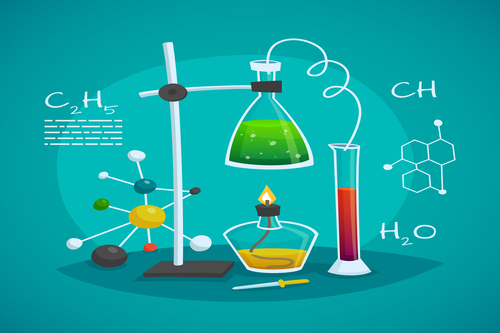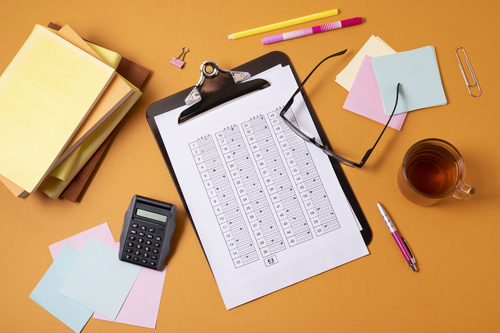Table of Contents
- SAT Chemistry Subject | All about the test!
- SAT Chemistry Subject | Test guide!
- SAT Chemistry Subject | How to prepare?
- Scoring in the SAT Chemistry subject test
- Syllabus breakdown
- SAT Chemistry Subject | Test format
- SAT Chemistry Subject | Test taking strategies
- Strategies to maximize your subject test score
- Key takeaways
- FAQs
SAT Chemistry Subject | All about the test!
The SAT Chemistry subject test is a popular examination specifically designed to evaluate students’ understanding and competence in Chemistry. It offers students a chance to demonstrate their mastery of the topic and is crucial in determining whether they get into their desired college.
In this article, we will discuss the syllabus of the SAT Chemistry subject test, its unique format, and the scoring mechanism followed. Students can effectively strategize and ensure a high score by understanding these elements related to the SAT Chemistry exam.
SAT Chemistry Subject | Test guide!
The SAT Chemistry subject test is a one-hour, multiple-choice exam focusing on a student’s comprehension of high school Chemistry. Whether you are aiming to pursue Chemistry as a major or simply want to strengthen your college application, understanding the SAT Chemistry subject test is essential.
This subject test syllabus is designed to reflect the major topics covered in high school Chemistry courses. It includes inorganic chemistry, organic chemistry, physical chemistry, analytical chemistry, lab experience, and general topics.
The test consists of 85 multiple-choice questions that need to be answered within 60 minutes. In this scenario, you also need to be aware of the negative marking scheme, where 1/4th of a point is deducted for every incorrect answer.
SAT Chemistry Subject | How to prepare?
To ace the SAT Chemistry subject test, students must fully grasp high school Chemistry concepts. This includes topics like the periodic table, chemical reactions, stoichiometry, and thermodynamics. Spending time with textbooks and classroom notes will be foundational.
Practice with sample papers
Regular practice with sample papers and previous year’s questions is vital. This helps you familiarize yourself with the SAT Chemistry subject test’s question pattern, difficulty level, and pacing.
Lab experience
The SAT Chemistry subject test covers 15% of lab-related questions, making hands-on lab experience an invaluable part of your preparation. Simulating real lab scenarios through digital laboratories and working with actual equipment can be a crucial step to acing the test.
Time management
The SAT Chemistry subject test’s time constraint of 60 minutes could appear intimidating. Timed practice exams and learning how much time to devote to each question can help you learn how to manage your time effectively.
Scoring in the SAT Chemistry subject test

Score range
The SAT Chemistry subject test is scored on a scale of 200 to 800. The raw score, calculated from the correct and incorrect answers, is then converted into a scaled score.
Understanding your score
An excellent SAT Chemistry subject score is typically considered to be 700 or above. Understanding where you fall in this range can help you gauge how competitive your score is for the colleges you are targeting.
Factors affecting the score
The score on the SAT Chemistry subject test is affected by the number of correct answers, incorrect answers (due to negative marking), and the difficulty level of the test.
Syllabus breakdown
General Chemistry – 30%
- Atomic structure: Protons, electrons, neutrons, isotopes.
- Molecular structure: Bonding, molecular geometry.
- Chemical reactions: Balancing equations, predicting products.
Organic Chemistry – 25%
- Nomenclature: Naming organic compounds.
- Functional groups: Alcohols, ethers, ketones.
- Reactions: Addition, substitution, elimination reactions.
Physical Chemistry – 20%
- Kinetics: Reaction rates, catalysts.
- Thermodynamics: Enthalpy, entropy, Gibbs free energy.
- Quantum Chemistry: Quantum numbers, electron configurations.
Analytical Chemistry – 15%
- Laboratory: Handling of chemicals, safety.
- Techniques: Titration, chromatography, spectroscopy.
Inorganic Chemistry – 10%
- Coordination Chemistry: Ligands, coordination numbers.
- Solids and metals: Crystal structure, metallic bonding.
SAT Chemistry Subject | Test format
The SAT Chemistry subject test consists of 85 multiple-choice questions. Here’s a breakdown of the format:
- Time: 60 minutes.
- Marks: 200 to 800.
- Negative marking: For every incorrect answer, 1/4th mark will be deducted.
Sections
- Single correct answers: Multiple options with only one correct answer.
- Matching type questions: Questions related to the classification or matching type.
- Relationship analysis: Analyzing relationships between different statements.
SAT Chemistry Subject | Test taking strategies

While general test-taking strategies are essential, some specific strategies can make a difference in the SAT Chemistry subject test:
- Answering order: Focus on questions you’re confident about first. Mark the ones you’re unsure about and come back to them later.
- Understanding the periodic table: Given that a periodic table is provided during the test, understanding how to use it efficiently can save time.
- Applying real-world knowledge: Sometimes, relating the question to real-world scenarios or laboratory experiences can lead to the correct answer.
- Avoiding random guessing: With a quarter-point deduction for wrong answers, random guessing can decrease your SAT Chemistry subject score. Make educated guesses when possible.
Adaptive online resources
In the digital age, various online platforms provide adaptive learning experiences tailored to your needs. Platforms offering personalized quizzes, interactive videos, and real-time feedback can be valuable in your preparation for the SAT Chemistry subject test. They often align with the college boards’ specifications, ensuring the material’s relevance and effectiveness.
Connecting with Chemistry mentors and tutors
Finding a mentor or tutor specializing in Chemistry can enhance your understanding of complex topics and provide personalized strategies and feedback. Whether it’s a teacher, a college student with a strong Chemistry background, or a professional tutor, one-on-one guidance can make a significant difference in your preparation.
Strategies to maximize your subject test score
Understanding the test format and syllabus is essential, but it’s equally important to adopt strategies tailored to the SAT Chemistry subject test:
- Targeted practice: Focus on weak areas while maintaining strong areas.
- Use of technology: Utilize online resources, simulators, and interactive learning apps.
- Joining study groups: Collaboration with peers can enhance understanding and make learning enjoyable.
- Seeking professional guidance: A tutor with experience in SAT Chemistry subject can provide personalized coaching, tailored strategies, and continuous motivation.
- Choosing the right test date: The test date you choose is very important. To ensure that the subject is still fresh in your mind, it is advised to time your exam date to coincide with the completion of your Chemistry study. Most students decide to take the exam in May or June after finishing an AP Chemistry course or an equivalent.
Key takeaways
- Know the detailed syllabus; including General Chemistry, Organic Chemistry, Physical Chemistry, Analytical Chemistry, and Inorganic Chemistry.
- Familiarize yourself with the 85 multiple-choice questions format, the marking scheme, and the different sections in the test.
- Tailor study plans, use technology, join study groups, and seek professional guidance if needed.
- Regular practice and review of mistakes are crucial for improvement.
Even though the SAT Chemistry subject test can appear challenging, achieving a good score is easily within grasp if the guide, curriculum, structure, and a detailed study plan are well understood.
Dedication, practice, and astute planning are necessary to comprehend the topic’s complexities and apply them to ace the test. Always remember that improving your knowledge and abilities on the subject is just as important as getting a good grade and that doing so can open doors to further chances for learning.
We hope this blog was insightful. If you need further assistance with standardized tests or anything related, feel free to reach out to us!
Liked this blog? Read more: SAT math formulas | 12 key formulas, practice tips and more!
FAQs
Q1) How much time should I spend preparing for the SAT Chemistry subject test?
Answer: A preparation plan spanning 3 to 4 months with consistent daily study should be sufficient. However, it can vary based on individual needs and prior knowledge.
Q2) Can I use a calculator on the SAT Chemistry subject test?
Answer: No, calculators are not allowed on the SAT Chemistry subject test. Familiarize yourself with the formulas and calculations required for the test.
Q3) What resources are recommended for studying the SAT Chemistry subject test?
Answer: Combining standard Chemistry textbooks, SAT Chemistry subject-specific guides, online platforms, and practice tests can provide a robust preparation plan.






